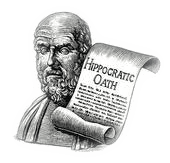 One of the distinguishing characteristics of the various healthcare professions is the code of ethics that binds practitioners to “do no harm” – the Hippocratic Oath. This famous code of ethics serves as a testament to the dedication of the oath-taker to the profession as well as to society as a whole. The need for Hippocratic Oath in the context of a healthcare professional is obviously due to the fact that they are literally responsible for the health and well-being of others. This oath is still taken to this day in various forms – in fact, I witnessed my brother taking an altered version of this oath when he graduated from pharmacy school.
One of the distinguishing characteristics of the various healthcare professions is the code of ethics that binds practitioners to “do no harm” – the Hippocratic Oath. This famous code of ethics serves as a testament to the dedication of the oath-taker to the profession as well as to society as a whole. The need for Hippocratic Oath in the context of a healthcare professional is obviously due to the fact that they are literally responsible for the health and well-being of others. This oath is still taken to this day in various forms – in fact, I witnessed my brother taking an altered version of this oath when he graduated from pharmacy school.
Being a student of industrial-organizational psychology, you might begin to wonder if a similar oath would have a place in the world of business. Do the actions of leaders as business professionals have permanent and lasting effects on the well-being of society? Clearly, the answer is a resounding “yes.” It might then be useful to implement a similar oath for business leaders in order to keep “honest” men honest.
It turns out that Khurana and Nohira did just that in their article, It’s Time to Make Management a True Profession (2008). They believe that one of the defining characteristics of any true profession is adherence to code of conduct. They also recognize the fact that many corporations do indeed have codes of conduct, but there is no universal set of values that is accepted across the entire profession. With that, they created the Manager’s Hippocratic Oath. Treviño and Nelson (2011, p.48) summarize the 8 distinct principles articulated in Khurana and Nohira’s article:
- Service to the Public and Society
- Balance Multiple Stakeholders’ Interests
- Acting with Integrity in the Enterprise’s Interest
- Adherence to the Law
- Accurate and Transparent Reporting
- Respectful and Unbiased Decision Making
- Professional Development
- Responsibility to Protect the Profession
From an I/O perspective, it is worth noting that the principles taken from the oath closely mimic the principles of ethical leadership: “builds community, respects others, serves others, shows justice, manifests honesty” (Northouse, 2013, p.431). The main difference is that the Manager’s Hippocratic Oath devotes attention to corporate stakeholders, as well as advancing the profession and maintaining it’s reputation (Khurana & Nohria 2008).
Related Video: Business Graduates Take Oath of Honor – TIME.com
Codes of ethics are valuable because they maintain feelings of obligation toward one’s profession that might not otherwise exist (Khurana & Nohria 2008). In addition to simply providing behavioral guidelines, they are also responsible for invoking feelings of pride when behaving ethically, or shame when behaving unethically (Khurana & Nohria 2008). From this, we can see that ethics in a business setting are not only responsible for promoting socially acceptable behavior — they are also responsible for maintaining the reputation of the business profession in its entirety.
References:
Business Graduates Take Oath of Honor. (n.d.). TIME.com. Retrieved April 22, 2014, from http://http://content.time.com/time/video/player/0,32068,23218019001_1898975,00.html
Hippocratic Oath. (2012, July 2). U.S. National Library of Medicine. Retrieved April 22, 2014, from https://www.nlm.nih.gov/hmd/greek/greek_oath.html
Ivory, D., Ruiz, R., & Vlasic, B. (2014, April 19). Sending Alerts Instead, G.M. Delayed Car Recalls. The New York Times. Retrieved April 22, 2014, from http://www.nytimes.com/2014/04/20/business/sending-alerts-gm-delayed-recall-of-cars.html
Khurana, R., & Nohria, N. (2008). It’s time to make management a true profession. United States: Harvard Business School Publ. Corp.
Northouse, P. G. (2013). Leadership: theory and practice (6th ed.). Thousand Oaks: SAGE.
Treviño, L. K., & Nelson, K. A. (2011). Managing business ethics: straight talk about how to do it right (5th ed.). New York: John Wiley.
